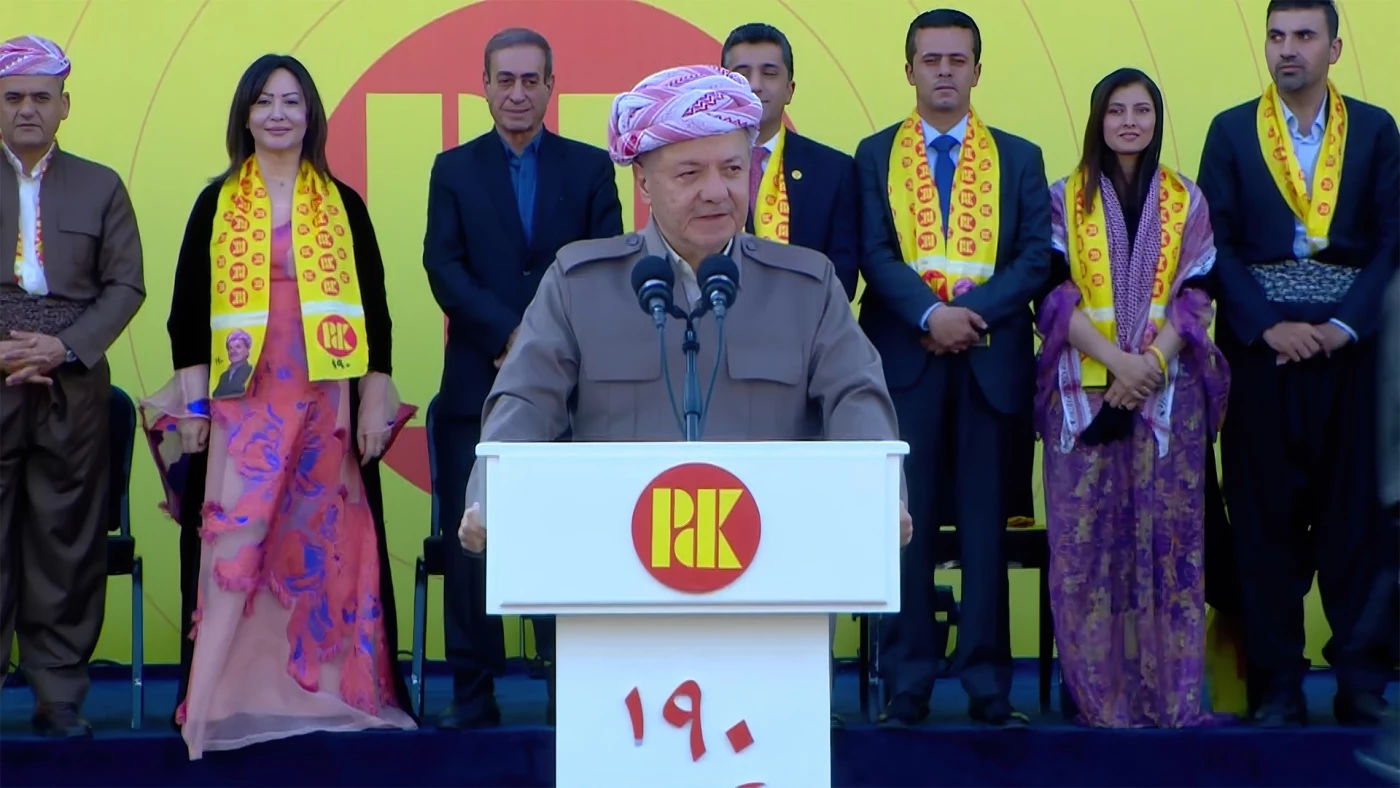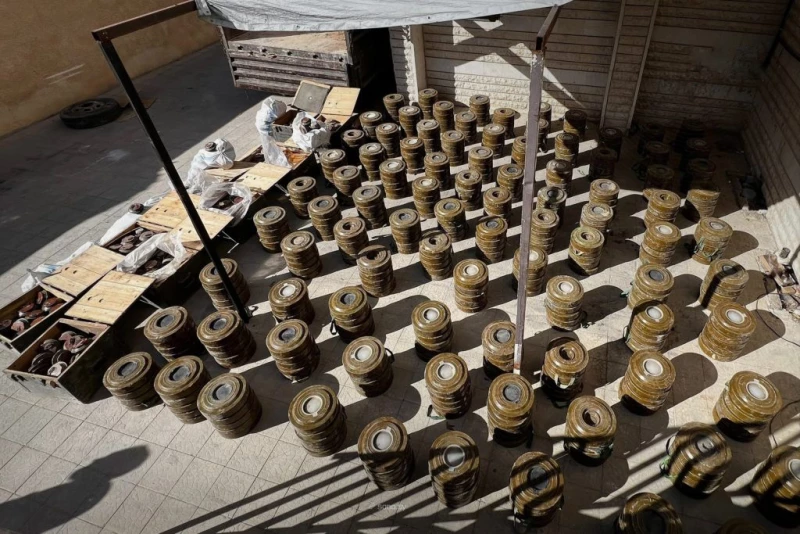ERBIL, Kurdistan Region of Iraq - President Masoud Barzani of the Kurdistan Democratic Party (KDP) addressed around 70,000 supporters at the party’s final and largest rally ahead of the October 20 parliamentary elections. During his speech, Barzani spoke about the vote, and regional tensions amid Israel’s war on Gaza and Lebanon.
“We are entering the elections process at a time the region is gripped by a difficult and sensitive situation,” Barzani said. “We have already begun efforts in every way with our friends in Baghdad that Iraq in general, and the Kurdistan Region in particular, must refrain from entangling in this fire."
Lebanese Hezbollah and the Israeli military have been engaged in frequent cross-border exchanges of fire for over a year, but tensions have been at an unprecedented high for nearly a month after a major cyberattack in Lebanon in mid-September.
Both sides have intensified their strikes in recent weeks. The Israeli army has launched a ground aggression in southern Lebanon aimed at “dismantling” Hezbollah and its capabilities, and also killed several top “Axis of Resistance” leaders, including former Hezbollah chief Hassan Nasrallah in an airstrike on Beirut’s southern suburbs.
Despite nearly daily rocket attacks from Iraq by Iran-backed Shiite militia groups, the Iraqi government has said time and again they were against dragging Iraq into an all-out regional war and said the last decision is vested in the government authorities in Baghdad.
The KDP president went on to say that it was "the responsibility of officials in Baghdad, and those of the Region to try to avoid the Kurdistan Region and Iraq from being dragged into this fire.”
“We are optimistic that all the sides involved will resort to dialogue to resolve these issues peacefully," Barzani said.
KDP’s participation in the elections
The KDP with number 190 given to the party by the Iraqi High Electoral Commission (IHEC) for the parliamentary elections, has a similar number of candidates across the four electoral districts, including 64 candidates in Erbil, 72 in Sulaimani, 48 in Duhok and six in Halabja.
In the previous parliament term, the KDP had 45 seats, eyeing an outright majority once again.
"The KDP owns the idea of elections in Kurdistan. During the spring of 1991 in Koya city, I initiated that elections must be held in Kurdistan in order to transition from revolutionary legitimacy to the phase of constitutional legitimacy,” Barzani said. “From the first election until the very last one, the KDP had always emerged in the first place, and it will remain as such."
KDP's Barzani urged the rally's attendants to head to the polling stations on October 20 and vote for his party's candidates in order for Kurdistan to "remain in safe hands."
“The next parliament is before a difficult task. it needs those people who are enthusiastic about the nation and the people,” Barzani said.
The KDP leader added: "The next parliament’s first job is to draft a constitution, amend some laws, pass some other laws and erase the aftermath of those plots and decisions made against the Kurdistan Region in an effort to eliminate the Region’s entity," Barzani said.
Campaigning for the Kurdistan Region elections will conclude at 11:59 pm on Tuesday, according to the Iraqi electoral body.
The Kurdistan Region witnessed 20 days of intensive campaigning, something President Barzani said must end right after the elections.
"After elections, this chaos must not continue in Kurdistan” Barzani said, adding Kurdistan is “one Region, one parliament, one government and one Peshmerga force.”
The president of the Kurdistan Region's ruling and largest political party said after the elections, they would extend "a brotherly hand" for all the sides.
“After the October 20 elections, the KDP with an open heart, and the feeling of a great responsibility, will extend a brotherly hand to all the sides, and our only condition is loyalty to the blood of martyrs and the Kurdistan land,” he details. “At the end of the day, we are all Kurds and from Kurdistan, and the people of this country. Do not ever ponder achieving anything by antagonizing and challenging the KDP. By God, what you could achieve through friendship and brotherhood with the KDP, you will never obtain it by force.”
“I hope all the parties, including the KDP, will re-examine themselves and think about the future of the Region on how to protect it and deepen the brotherhood spirit among this nation, and on how to make use of the past mistakes, as well as provide better services to the people of the Kurdistan Region,” he said.
What you need to know about Kurdistan elections
For the first time in three decades, the electoral system was changed by dividing the Kurdistan Region into four constituencies - Erbil, Sulaimani, Duhok, and Halabja. In other words, members will be elected by open-list proportional representation, representing the Region’s four provinces.
A total of 38 seats have been reserved for Sulaimani province, 34 for Erbil, with the remaining 25 and three going to Duhok and Halabja respectively.
The Supreme Court in Iraq initially dismantled the 11 seats reserved to minorities, reducing seats at the legislature from 111 to 100, a decision which triggered widespread anger among Turkmen and Christian minorities.
Following a lawsuit by a Turkmen party, the court partially revoked its decision by dedicating five of the 100 seats to the minorities. Of the five seats, three were allocated to Christians - two Assyrians and one Armenian, and two to Turkmens.
The elections had initially been set for October 2022 but were delayed several times since. They were most recently scheduled for June 10, 2024, before being postponed after the Region’s ruling KDP announced its withdrawal, demanding changes to the allocation of minority quota seats and constituency seats. The party eventually registered to participate after some of its demands were met.
Around 3.8 million people were eligible to vote in the upcoming elections, out of which nearly three million have completed the biometric process and will be able to cast their ballots on October 20.
According to the IHEC, there will be more than 1,400 polling stations across the Kurdistan Region.
The Kurdistan Region last held its parliamentary elections in 2018.



 Facebook
Facebook
 LinkedIn
LinkedIn
 Telegram
Telegram
 X
X


